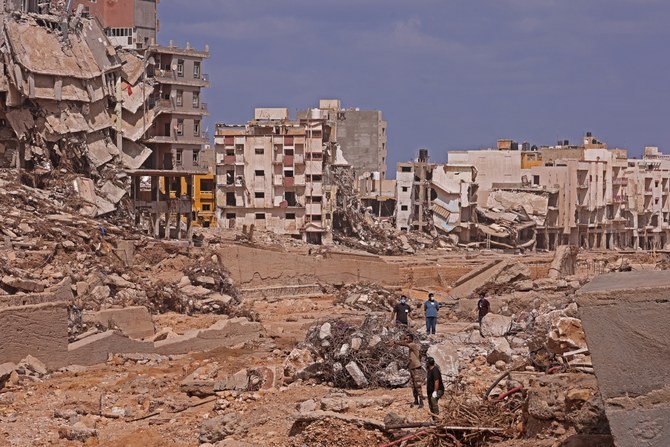Muslims and Jews must join forces to fight climate change

https://arab.news/4uqma
We have just entered the month-long season of the Jewish High Holy Days, which began with the onset of Rosh Hashana, the Jewish New Year, to be followed by Yom Kippur, the Day of Atonement, which is the principle Jewish day of fasting. The two holidays are a time for every Jew to undertake a period of self-examination, in which each of us reflects on all that has occurred in our lives over the past 12 months and repents for any wrong actions we may have taken. After Yom Kippur comes the week-long festival of Sukkot, a harvest-time holiday emphasizing the savoring of the fruits of the Earth, which connects us palpably to agriculture and the natural world.
This year, more than ever, the High Holy Days are an appropriate time to contemplate the harsh reality that our entire human family has so far failed to effectively deal with the difficult challenge of fast-escalating climate change. This puts at grave risk our collective efforts to ensure a sustainable future for ourselves, our children and the multiplicity of plants and animals with whom we share this resplendent globe, created for us by the God we all revere.
For evidence of that failure, we have only to look at the just-concluded summer of 2023, the hottest in recorded history, according to the World Meteorological Organization. Heat records were shattered for weeks at a time in North America, Europe, Asia and across the Middle East, where temperatures soared ominously toward the level of human sustainability.
As the climactic horrors of the summer made unmistakably clear, none of us, wherever we reside, are safe anymore
Rabbi Marc Schneier
In its wake, the punishing global heat unleashed fire and flood. Deadly wildfires spread with shocking rapidity from forest and savannas into populated areas in Turkiye, Greece, Spain and the Hawaiian island of Maui, sometimes killing hundreds at a time. The multiple fires that burned out of control in remote northern Canada sent enormous columns of soot and ash into the atmosphere, which soon covered the eastern US, including my hometown of New York City. Like millions of fellow New Yorkers, I was forced to stay inside my apartment for days at a time, sadly looking out over a city shrouded in a thick and poisonous haze.
Meanwhile, flash floods, which have greatly increased in intensity over the past few years due to climate change, ravaged countries around the world. Most recently, we have witnessed the catastrophic flooding of Derna, Libya, where more than 10,000 people died in a matter of minutes.
As the climactic horrors of the summer made unmistakably clear, none of us, wherever we reside, are safe anymore. In this crisis, I believe spiritual leaders have a moral obligation to step into the breach. We have the responsibility to cite the sacred texts of our various religions, which show reverence for the planet. We must forcefully remind political and business leaders that our sublimely beautiful planet was given by God to Adam and his descendants to nurture and preserve, with a clear command not to damage the natural order.
It is not surprising that Israel and the Arab world have been at the forefront of addressing climate change issues
Rabbi Marc Schneier
Certainly, these injunctions are crystal-clear in the holy books of Judaism and Islam. The Qur’an (Surah Al-Rahman 55:7-10) pointedly reminds human beings that “Allah raised the heavens and established the balance so that you would not transgress the balance … He laid out the Earth for all living creatures.” As for Judaism, the famous rabbinic commentary on the Book of Genesis states: “When God created the first human beings, He led them around the Garden of Eden and said, ‘Look at my works. See how beautiful they are — how excellent. For your sake I created them all. See to it that you do not spoil and destroy My world; for if you do, there will be no one else to repair it.’”
Given the commitment to upholding and restoring the natural order in Judaism and Islam, it is not surprising that Israel and the Arab world have been at the forefront of addressing climate change issues. Israel has long been a leader in developing innovative techniques in renewable energy and green agriculture, which it has shared with countries around the world. For its part, the UAE has invested more than $50 billion in renewable energy projects across 70 countries, with an addition $50 million still to be spent, while Saudi Arabia is rapidly emerging as a global leader in ecofriendly practices. In a demonstration of that commitment, Saudi Arabia will host World Environment Day on June 5, 2024, with a focus on land restoration and drought resilience.
As a long-time advocate for Muslim-Jewish cooperation, I believe our two communities should make common cause around the world in this holy mission to succor the Earth. As I said in a speech at the Summit of Climate Conscience in Fez, Morocco, in 2016: “Muslims and Jews share a common faith and a common fate. What we must do is to join forces to heal the world together; by confronting the threat of climate change.”
After all, the alternative to taking positive action on this existential threat to all of us is simply too dreadful to contemplate.
- Rabbi Marc Schneier is president of the Foundation for Ethnic Understanding and a noted adviser to many Gulf states.










































